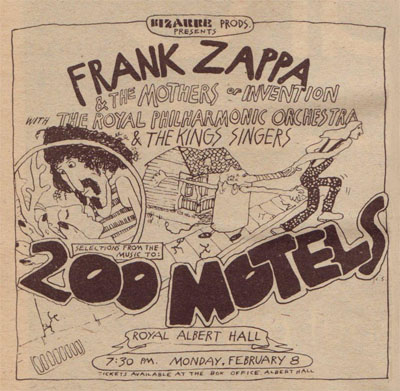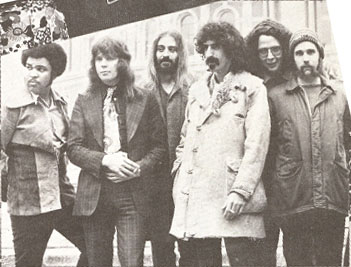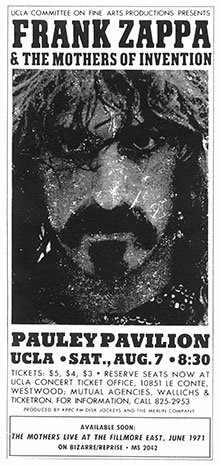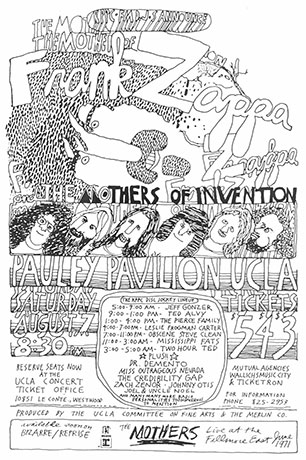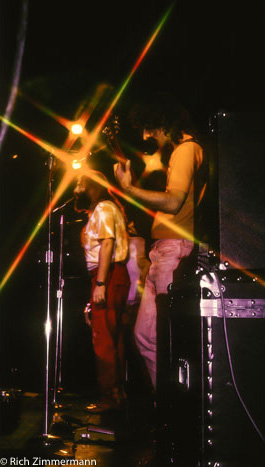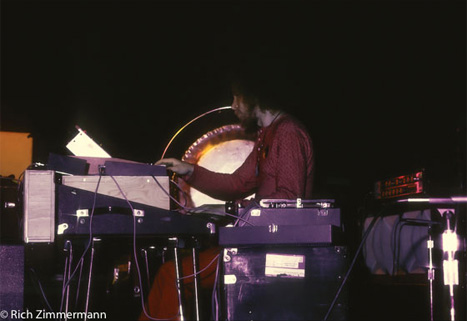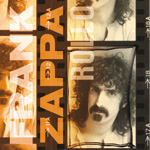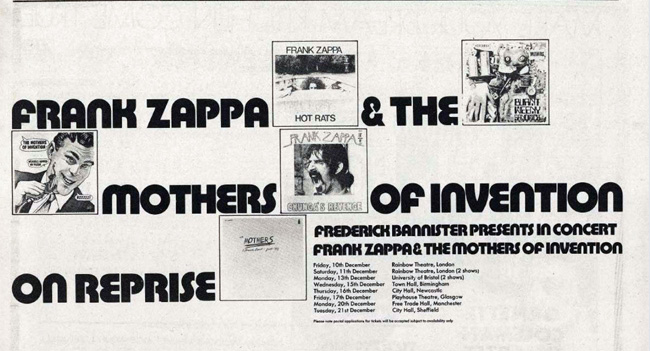December 4, 1971—Montreux, Switzerland
The 1971 European winter tour gets the award for being hte most disasterous. On December 4, we were working at the Casino de Montreux in Geneva, Switzerland, right on the edge of the lake- just in front of Igor Stravinsky Street—a venue noted for its jazz festivals.
In the middle of Don Preson's synthesizer solo on "King Kong," the place suddenly caught fire. Somebody in the audience had a bottle rocket or a Roman candle and had fired it into the ceiling, at which point the rattan covering started to burn (other versions of the story claim the blaze was the result of faulty wiring). There were between twenty-five hundred and three thousand kids packed into the room—well over capacity. Since more kids were outside, trying to get in, the organizers had cleverly chained the doors shut. When the fire began, the audience was left with two ways out: through the front door, which was pretty small, or through a plate-glass window off to the side of the stage.
I made an announcement—something like: "Please be calm. We have to leave here. There is a fire and why don't we get out?" You'd be surprised how well people who speak only French can understand you when its a matter of life and death. They began filing out through the front door.
As the room was filling with smoke, one of our roadies took an equipment case and smashed the big window. The crew then began helping people to escape through it into some kind of garden place below. The band escaped through an underground tunnel that led from behind the stage through the parking garage.
A few minutes later the heating system in the building exploded, and some people were blown through the window. Fortunately, nobody was killed and there were only a few minor injuries—however, the entire building, about thirteen million dollars' worth, burned to the ground, and we lost all our equipment.
In the April 1999 issue of Guitar magazine there is an interview with former Deep Purple guitarist (and my idol for many years) Ritchie Blackmore. In the article Ritchie mentions Zappa two separate times. In the first instance while discussing the abuse Blackmore had to handle from the record company he says: "As Frank Zappa would say, 'I smell a rat'"
The next quote follows:
Q: Can you elaborate on the story told in "Smoke on the Water"?
A. We were sitting there watching Frank Zappa play and suddenly someone had one of those flare guns and decided to let it off. It set the roof on fire. Frank turned around and said, "Now everybody clam down." He then threw down his guitar and jumped out the window. It was quite funny. He wanted to be the first one out. We then had about 15 minutes before the place was gutted, which was frightening.
If memory serves when Frank told the story he was more like a traffic cop and made sure all the kids got out first. Ritchie never took drugs, but did tend to drink so maybe his recollection of Zappa leaping out a window is blurred, so the question is: what really happened? Did Zappa throw down his guitar (SG?) and leap out the window while Blackmore sat calmly and observed as the place burned down or is this like the Kurosawa film Rashamon, where everyone remembers things somewhat differently?
Jim Pons, interviewed by Steve Moore, April 24, 2000
The fire broke out in the last few minutes of a 90 minute show . . . during the encore we never should've given. We were playing "King Kong" and I looked up to see flames in the second or third row of the balcony. They were small enough that I remember thinking someone could put them out in a matter of seconds by beating them with their coats. We continued playing, but it seemed like everyone else was over reacting. People in the front came up on stage and ran through us and past us to get to who knows where. Immediately our stage managers told us to put our guitars down and get to the side of the stage. I saw the fire fall down from the balcony to the seats below and then I realized that it was becoming a serious emergency. People were screaming and scrambling in all directions to find doors which, in an old theatre like that, were few and far between. Our bus driver ushered us downstairs through some kind of kitchen area where we were safe from the crowd for a minute but there were no doors and no where else for us to go. Unbelievably smoke was already coming down there with us. It was an old building, burning fast, and it sounded like it was about to collapse on top of us. The bus driver used his fist to break a glass wall that led to the outside through which we escaped. It had been less than two minutes since we were playing. An unreal episode, but one that we still thought was going to come under control until we got out onto the street and watched the building burn to the ground. It turns out that members of Deep Purple were also watching from their hotel across the water. The next day after suveying the damage and walking through the rubble of what used to be the stage, Frank uncharacteristically allowed us to vote on whether or not to continue the European tour. It would take at least two weeks to get reorganized, but we still had several weeks of sold out concerts remaining. It also meant having to replace everything destroyed in the fire . . . instruments, lights, sound system, all of Frank's guitars. We voted to continue.
That incident was very strange to me. First of all the tour schedule was printed on a box of matches. Second, on the day before the fire, in the middle of my solo on 'King Kong', someone ran out on the stage and issued a fire warning. On the next night, in the middle of my solo on 'King Kong', some one threw a firecracker up to the ceiling, which was covered with dry palm leaves, and started the fire. While that was happening Zappa's sewer backed up in his LA home and the entire basement studio was flooded with piss and shit.
The London Film Festival had invited me to speak three times at the director's forums. So we were kind of packed up and going at the same time. And we got a suite together in London. [...] Okay, so somehow Frank and I ended up in London together, because I guess he wanted to be with me in London, and I wanted to be with him. He was there for about four or five days with me, and then he had to go on tour. So I was staying behind to do some publicity. And then all I remember is I ended up on a plane to Switzerland, because I was invited!
On December 4, 1971, I went to Montreux with my friends, to attend the Frank Zappa concert that was going to take place in the afternoon.
[...] At that time, there were no chairs, it was not yet the fashion of the standing concerts, and the public sat on the floor, sometimes on a cushion or on a jacket rolled in a ball, which was my case.
That day, there was an unusual decoration on the ceiling. It was probably planned for the end of the year celebrations, and it seems to me that it was a tropical decoration, with or interlacing reeds or lianas, with paper or polystyrene flowers perhaps. What is certain is that all this material was dangerously flammable, as the future has proven!
[...] So here we are, after about an hour and 20 minutes, the band has just played the melody from King Kong, and leaves the stage to Don Preston for a synthesizer solo. Don fiddles with the oscillators of his Mini-Moog, it is a coincidence, but he produces sounds that may sound a bit like an alarm.
I'm sitting in the center, about 2/3 of the way across the room. The sound of the synth suddenly stops, and I see flames in the ceiling 10 or 15 meters away from me on the right. Mark Vollman says "Fire! Arthur Brown in person!" Then Zappa says "Calmly go towards the exits, ladies & gentlemen".
I didn't see, but a guy fired a flare gun towards the ceiling. At the beginning, the fire is very small, I think that it will be put out quickly and that the concert will continue. I drag a little to go out, I hesitate to leave my jacket rolled up on the floor keep my space on the floor, well in front of the stage!
People go out quickly and very calmly, and the firemen and guards on duty get a little upset to get us out faster.
The fire grows quite quickly, and people open the curtains that hide the windows on either side of the stage. I see some people grab chairs to break the glass.
I see a little blood, someone has been injured, but it seems to be minor.
Once the windows are broken, we feel a big draught rushing in the room, which drives away the smoke, but also fuels the fire.
I decide to go out that way, the ground must be about three meters down, there is a ledge I hang from and I drop into the grass without any problem.
A friend of mine, whom I didn't know at the time, told me this:
"Alain, I was there too! It is with a WEM speaker cabinet sound system that was on stage that I grabbed with other people to break the windows, which enabled us to escape by jumping in the grass below...
I remember very well Zappa very calmly telling the audience to get out without panicking. I think that his calmness allowed a quick and safe evacuation.
In the rush, I had left a small Moroccan bag in which I had put my things and an Afghan coat (made of sheepskin, very trendy at that time) and especially my documents. Before jumping, I went back on my steps to take back my things which were exactly where I had put them.
Coming out of the smoke, a fireman, visibly surprised to find me there in front of him kindly asked me to leave... "quickly because it's very dangerous to stay there!"
I had the impression that Don Preston's "moog" was still making weird sounds on the deserted stage... So I grabbed my stuff and quickly walked out through the broken windows. It seemed to me that a few moments later, the ceiling collapsed."
[...] The stage was very low, at most three feet, and that's what made it easy for another friend of mine to climb it and end up walking down a backstage staircase with Zappa.
Another guy managed to reach out and grab Frank's wah-wah pedal. Being a guitarist, he still uses it today. Appart from a cowbell mentioned by FZ in an interview, it may be the only instrument to have survived the fire.
After jumping from the window, I go around the building to find my friends, and I see people coming out of the main door with Zappa posters in their hands.
I can't imagine that the whole building is going to burn down in a very short time, so I go back in through the main door and come out with some posters.
[...] Then, the building is totally on fire, the night falls and it is really impressive.
I particularly remember the moment when the roof collapsed to the first floor with a loud noise.
The [Deep Purple] lyric says [it was started] by some crazy with a flare gun. I would argue that, because I thought I saw a chunk of the ceiling fall out near the sound desk and it was on fire. But I never remembered seeing a flare gun go off, which I think you wouldn't miss. We started to get everybody out of the building and Frank, in his coolness, his on stage persona: wonderfully cool—he called the audience boys and girls a lot of the time—said, "Boys and girls, let's all relax. I want everybody to be calm. We'll leave the building and when the smoke clears, we'll come back and finish the show. Everybody gonna do that?" And everybody got up walked out like it was the end of the show, and there were people passing out flyers for the next week's show at the exits, people were taking flyers and just walking out like it was real normal. Otherwise it could have been disastrous.
But by the time I got to the stage, yelled at the sound guys, "Leave it, get out of here, let's go," and then we had to go downstairs and out through a tunnel to the parking lot which was where our two trucks and the Rolling Stones mobile recording studio were, the roof was going off of that four storey building. So I'm thinking that fire started way up inside the building.
[...]
Everything [was gone]. All of his guitars . . . Ian grabbed one or two of his cases with his woodwinds in, and I think that's the only thing that survived. We went back that evening when the fire had gone out—and by the way, I still have that image in my mind of going back to the hotel, which was walking distance, and looking back and seeing the smoke coming out of the building and going up maybe a thousand feet, and then the wind caught it and took it out, and thinking how fitting Deep Purple's lyrics for "Smoke On The Water" were.
I often wonder, maybe you've heard, whether they wrote that as kind of a novelty song—as kind of a story—but did they ever realise it that would become so popular?
[...]
Now you see, we were scheduled to go to Paris.
The first phone call I made was to Herb Cohen—in the middle of the night. Herb was as much as a colourful personality as Frank was—even more so in some ways. He had a New York accent, and he was saying "So what are you calling me for? What's up?" I said, "Well, we just went through a fire here in Montreux." "Well what about the fucking equipment, man?" I said, "It's all gone." "What the fuck? What do you mean?" He couldn't believe it. And so he said, "Can you guys get to France?" I said, "I doubt it—seriously, man. Because we've got no equipment. Where are we gonna get the equipment?" That was the major consideration. And he said, "Well, you're over there: you call the fucking promoters and tell them you can't come!" I was left to do the dirty work! So the second I call I made was to this guy in Paris who was putting on all of the shows in France.
Now it's my recollection, but I could be wrong . . . Frank actually said, "Put me on the first plane home," and the members of the band—particularly the two Turtles—were saying 'the show must go on' and talked him into it. Now I don't think we went to Paris: I think we went directly to London. But I could be wrong.
There have been some comments about what it was like when the fire started. From my point of view in the middle of the crowd, there was no sense of panic whatsoever. I didn't see any flare gun, only some sparks coming from the ceiling around a corner of the room. IG says he saw it but probably because he was sitting in a different place to me. The music coming to an end was the sudden, startling and disappointing thing. Everyone made their way out of the building in a fairly orderly fashion, albeit grumbling at the inconvenience. Some got lost in the basement, we heard afterwards, but put in the right direction by Claude.
During the exodus I was parted from my fellow band members and when I arrived at one of two cars we had parked in the alley outside, there was no sign of them. Thinking that they were still inside, I went back in to see. I remember walking around the empty place, pausing in front of the deserted bandstand and checking out Zappa's band's equipment. There was no one there however and so I went back out. At no time during all this did I sense anything of a fire; it just seemed as if a false alarm had gone off and everyone had had to leave the building.
Back outside again, I found the rest of the band waiting for me (I had the key) and some of them, including Paicey, were chatting with Aynsley Dunbar, Frank's drummer, and an old friend (he used to be married to Wendy. She was at the time, or at least recently had been, Paicey's girlfriend—this being years before she moved to LA and eventually hooked up with Ronnie James Dio). It was then that we had to get out of the way sharpish as the fire engines started arriving.
That was when things started happening fast. The fire broke out and spread very quickly. It must have been raging in the ductwork and crawlspaces in the ceiling all this time, out of sight. That is why there was a sense of calm about the proceedings. We drove back to our hotel, a little way along the coast, and watched from the bar in disbelief as the place burned away and into my dreams. The photograph of Claude on MH was taken in that bar and you can see the shock on his face.
December 10, 1971—Rainbow Theatre, London, UK

[p. 6-7.]
I was under the impression that you had your leg broken by an irate fan once, is that true?
Well, It was an irate person, I don't know whether he qualifies as a fan. He was a crazy person who was in the audience at a concert in a place called the Rainbow Theatre, in England, 1970 or 71, can't remember, and we just finished playing our encore, half the band was already off the stage, and the next thing I knew I wake up at the bottom of an orchestra pit, with a concrete floor, a broken leg, a broken rib, a hole in my chin, a hole in the back of my head, my head all the way over on this shoulder. They thought I had a broken neck. About 3 or 4,000 people sitting around going, "Huh? What? What happened?"
When I woke up, I didn't even know that I was on the road, you know, I just woke up and wondered where I was. And then I saw the guy, I wouldn't recognize him if he walked in this room right now, and I spent a month in the hospital in England, 9 months in a wheelchair, and a few more months with an orthopaedic brace on my leg. I was off the road for the better part of the year, during that period of time while I was in the wheelchair I produced 4 albums, the albums were Just Another Band From LA, Grand Wazoo, Waka/Jawaka, and Ruben And The Jets For Real. I wrote a Broadway musical, I wrote about 6 orchestra pieces, and when my cast came off I scratched my leg until all of the werewolf hair disappeared.
Don Preston still remembers the night vividly. "We played the concert, and at the end of the concert the lights all go down and the people are applauding. I was facing the back of the stage and didn't see anything at all until I heard this big noise from the audience. I turned around, and Zappa wasn't there." Zappa had been knocked into the orchestra pit. The injuries he suffered kept him laid up for the next year, and, as a result of his larynx being crushed in the fall, Zappa returned with a changed voice: his distinctive baritone. In his autobiography, Zappa dryly notes that his assailant received only a short jail sentence. Perhaps Zappa was unconscious when Don Preston saw another punishment being meted out: "The audience grabbed him [Zappa's attacker] and brought him back, and Herb [Zappa's manager] beat the shit out of him behind the curtain." Frank Zappa never made the same mistake twice, and for the rest of his life he employed a bodyguard. As for the Mothers, Preston says, "He never did call anybody to tell them that there was no band anymore. He just got a new band. I wasn't surprised by it. I just accepted it, because that was the way Zappa was."
Jim Pons, interviewed by Steve Moore, April 24, 2000
Frank got pushed into the orchestra pit of the theatre we were playing in London. My recollection of that event is hazy probably because I still hadn't gotten over what had happened in Switzerland. It was so unreal. Like in a dream. I remember images of Frank lying there, our road managers holding onto, and screaming at the assailant, the feeling of stunned disbelief that everybody felt. I think I myself must have blacked out by then. I don't recall much of anything after that except visiting Frank in the hospital before we left to come home. Everyone was sad and quiet.
We went into Paris. He wanted to go to try find some equipment. But they had had the May Day riots and there was some concern about them starting again, and they didn't want to have him do a concert. So that concert got cancelled. [...] So that was in Paris, and we were going from Paris to London. [...] Anyway, we had a half a day, and I decided to have the car—we had a chauffeur car—because it was going to be his birthday coming up. I thought I'd try and go find him some original music, by Stravinsky or somebody. So we were going to this music store to get him a present, and then I told the driver to turn around and go back. I went back to the dressing room to be with him, because this foreboding started again.
I think there were 3,000 people in the theatre. And there were 3,000 people waiting for the second show. So he goes up on stage and I was meeting some friends there. I was holding his coat. And I decided we should go up to the dressing room, and we were walking along the stairs and I literally dropped the coat and ran on stage. I didn't see the guy come up and knock him off, but I went to the front of the stage and looked down and he looked like a broken puppet. His leg was twisted—he was down, he was done. They called an ambulance, and I got in it with him—and there was like 6,000 people—you know: three in, three out—and everybody upset. We were in the ambulance, and he said to me, "Don't leave me." I said I wouldn't, and we went to a hospital.
Unidentified press clip, c. December 12, 1971
Zappa Thrown From Stage
LONDON (UPI)—American pop singer Frank Zappa suffered a broken ankle and concussion when a man grabbed him on the stage of a London theater Friday night and threw him 10 feet into the orchestra pit.
Police said the attacker told them he was upset because his girl friend had a "crush" on the singer.
Onlookers said the man leaped onto the stage of the Rainbow Theater and attacked the 31-year-old singer as Zappa and his group, the Mothers of Invention, were finishing the first of two shows.
Theater officials grabbed the man as Zappa lay unconscious with a broken ankle and concussion. Zappa was rushed to the hospital.
An estimated 3,000 fans saw the incident.
Later, Trevor Howell, 24, appeared at a London Court and was charged with causing grievous harm to Zappa.
The court released Howell on $500 bail until a further court appearance on the charge Dec. 20.
Howard Kaylan & Mark Volman, interviewed by Chris Van Ness, Los Angeles Free Press, August 18, 1972, p. 14
MARK: See, when we saw Frank laying in this pit and bleeding out of his head, and all of a sudden ten years of work kinda looked in one second to be over—I mean, he looked dead—
HOWARD: What does it mean? What are you going for? Is that what you want to be?
MARK: Do you want to be that big so somebody's chick loves you and he gets so crazy that he pushes you into a pit? Something that simple made me just—I drank for two months trying to appraise myself, 'cause all my life I had thought that that was a real good place to be—be a big pop phenomenon. And I don't believe it anymore.
HOWARD: Most people don't know, though, that the guy was going for you and Frank got in the way. We have bumper stickers available through our office that say simply in phlorescent green: "FRANK JUMPED" for anyone who is interested in them.

[p. 57.] Photo: Michael Putland.
